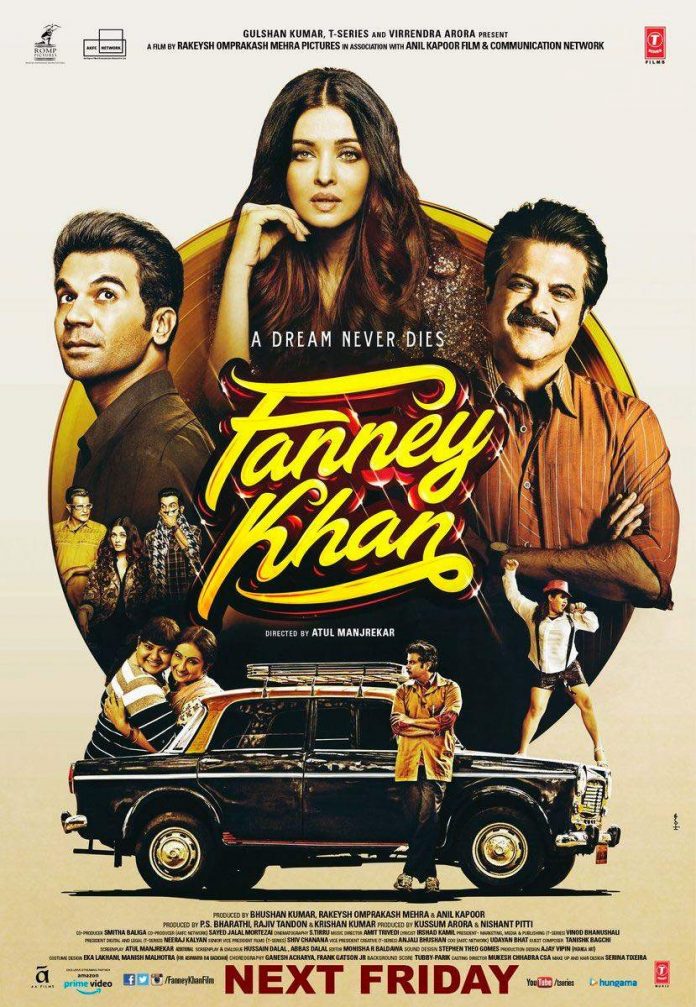T-Series, Virrendra Arora, Rakeysh Omprakash Mehra Pictures and Anil Kapoor Film & Communication Network’s Fanney Khan (UA) is the story of a man obsessed about making his daughter a famous singer and the lengths he goes to for that. It is based on Dutch film Everybody’s Famous (2000).
Prashant Sharma (Anil Kapoor) is a good singer who never got his due although he is popular amongst the locals, who often lovingly refer to him as Fanney Khan. He loves to sing, compose tunes and even write lyrics. He works in a factory where his best friend is Adhir (Rajkumar Rao). The day Prashant’s daughter is born, he decides to make her a world-famous singer like Lata Mangeshkar, and even christens her Lata.
Much to Prashant’s joy, Lata Sharma (Pihu Sand) grows up to be a promising singer but whenever she performs on stage in school/college, students literally boo her out because she is obese. This, obviously, disheartens her as much as it disheartens Prashant and his wife (Divya Dutta). Somewhere, Lata starts resenting her father accompanying her everywhere she sings and constantly questioning her about her choice of songs, clothes she wears for performances, etc. She snaps at him, talks rudely to him, even insults him. But Prashant behaves like an obsessed man with just one mission in life – to make Lata a singer. He even thinks in terms of cutting an album of Lata in the hope that it would make her an overnight sensation like Baby Singh (Aishwarya Rai Bachchan), a popular singer who charges Rs. 30 lakh for ribbon-cutting! Lata herself also idolises Baby Singh.
When the factory in which Prashant works shuts down, he fears, he would not be able to cut the album. He begins to drive a taxi for a living, unknown to his wife and daughter. One day, the famous Baby Singh hails his cab and in his desperation, Prashant kidnaps her so that he can demand a fat amount as ransom money for her family and use that amount to cut Lata’s album. He involves Adhir in his plan.
Along the way, the plan gets changed. Prashant, in disguise, meets Baby Singh’s secretary, Kakkad (Girish Kulkarni), and forces him to record a song in Lata’s voice if he wanted Baby Singh’s safety. Kakkad does so and after that, his evil mind hatches a plan to please his friend (Asif Basra) who runs a television channel and at whose talent hunt finale, Baby Singh was due to perform. Meanwhile, Baby Singh is being held captive and is tended to by Adhir.
What is secretary Kakkad’s plan? Does it find favour with the TV channel owner? What happens to Prashant’s dream of making Lata a world-famous singer? What happens to Baby Singh? Does Adhir go as per Prashant’s plan?
The story is inspired by the Dutch film, Everybody’s Famous, and it is quite nice. But the screenplay, penned by Atul Manjrekar, with additional screenplay by Hussain Dalal and Abbas Dalal, is far from good. In fact, there are gaping holes in the screenplay which trouble the viewers. For one, why do Lata’s school/college mates boo her merely because of her obesity? Are they deaf to not notice that she is immensely talented? Whoever in the world today insults talent like that? In contrast, the inhabitants of the chawl in which Lata lives are so supportive and appreciative of her because she is such a talented singer. Also, why Lata keeps snapping at and insulting her father whose world revolves around her is not explained or, at least, not justified. Lata’s reprehensible behaviour towards her own father, in fact, takes away from the sympathy the audience should feel for her – and this sympathy is paramount because she is the one Prashant is rooting for. Obviously, what’s a story in which a man is moving heaven and earth to make his daughter a singer, and that daughter – who, incidentally, shares the same dream of becoming a singer – seems to be an ungrateful and shameless creature? Yes, they may disagree on their choice of songs but should that give Lata the licence to insult her dad at every opportunity? In one scene, Prashant refers to his daughter’s perseverance when he says that she does riyaaz daily, but even dialogues like these don’t create much of an impact because they are not substantiated by visuals. Prashant’s action of kidnapping Baby Singh makes him appear like a self-centred ‘villain’ even though he has done it for the love of his daughter. All in all, while the audience is convinced that Prashant’s intentions are noble, they may not really approve of his actions, more so because they do not feel as much sympathy for daughter Lata as they should. The track of Baby Singh and her dog, Ustaad, looks hurried and contrived. The track of Adhir does add humour but even that is not of the kind which would make everyone laugh loudly. The climax should’ve been a tear-jerking one but it isn’t so, perhaps, due to the aforementioned drawbacks.
Before coming to the acting, a question: why do brilliant actors like Anil Kapoor and Rajkumar Rao have to act in such patently poor films? Anil Kapoor does a superb job as Prashant a.k.a. Fanney Khan. He brings out his angst, desperation and innocence to the fore wonderfully, with a performance that’s brilliant. Aishwarya Rai Bachchan looks glamorous and beautiful as Baby Singh but her performance could’ve been more layered and mature. Her style of dialogue delivery would be more suitable to a teenager – and she would do well to change it. Rajkumar Rao plays Adhir extraordinarily well. He is equally at ease in light scenes and in intense ones. But the scope he gets is limited. Pihu Sand makes a confident and decent debut as Lata Sharma. Girish Kulkarni goes overboard at times, as Baby Singh’s manipulative manager. Divya Dutta lends good support with her understated performance as Prashant’s wife, constantly trying to keep the balance between husband and daughter. Asif Basra is natural as the TV channel owner. Barbie Rajput (as Rhea) and Swati Semwal (as Jinal) are adequate. Ankit Sagar (as the factory supervisor) and Rajat Bhasin (as Jai) lend good support. Others are nice.
Atul Manjrekar’s direction is average. His narration does not make the audience feel too much for both, Prashant and Lata, simultaneously and that’s a major drawback. Given that the film is about music, it should’ve had outstanding music. But Amit Trivedi’s music (with one song – ‘Mohabbat’ – composed by Tanishk Bagchi) is not even hit, leave alone super-hit! Irshad Kamil’s lyrics are weighty. Ganesh Acharya and Frank Gatson Jr.’s choreography is alright. Tubby Parik’s background music is quite nice. S. Tirru’s cinematography is appealing. Ajay Vipin’s (Patanga Art) production designing is fair. Monisha R. Baldawa’s editing is alright.
On the whole, Fanney Khan is a poor fare and will not find appreciation. It will flop at the turnstiles.





























